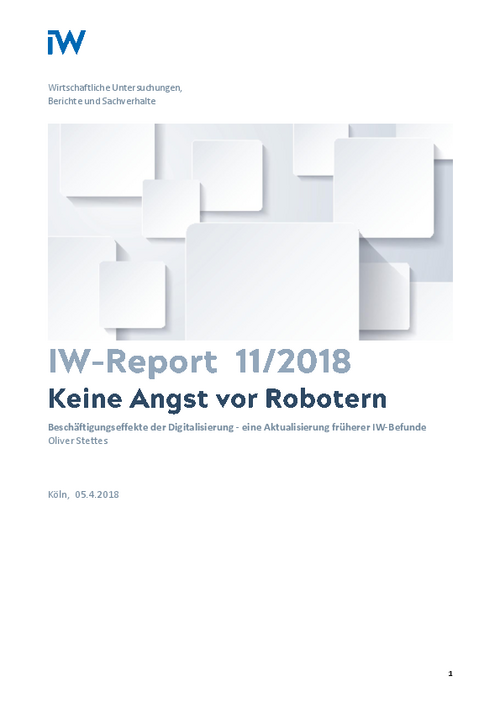The impact of digital change on employment and the employment prospects of workers remains a puzzle to be solved. The empirical analysis with data on the firm-level, the sectoral level and the occupational level does not indicate any general growth pattern.

Don’t Be Afraid of Robots: The Impact of Digitisation on Employment
IW-Report

The impact of digital change on employment and the employment prospects of workers remains a puzzle to be solved. The empirical analysis with data on the firm-level, the sectoral level and the occupational level does not indicate any general growth pattern.
The evidence, at least, suggests that an employment decline and mass job losses resulting from an ongoing process of digital change have not occurred yet. In this respect, doomsday prophecies are not likely to fulfill – at least in the short run or in the medium-term perspective.
Evidence based on the IW-Human-Resource-Manager-Panel shows that the proportion of highly digitised companies exhibiting an employment growth between 2014 and 2016 (50 per cent) exceeds that of less digitised firms (40 per cent). The same applies to the firms‘ plans to expand their staff size in the running calender year. However, the differences between highly and less digitised companies cannot be attributed to the level of digitisation.
The employment trend at the sectoral level is nonuniform and does not correlate with the level of digitisation of a sector or the change of this level over the recent years. While employment in the ICT-sector and in selected service sectors grew, it decreased in the finance and insurance industry. These industries have witnessed an acceleration of the transforamtion process. A significant employment growth, however, also occurred in the transport and health sectors where the level of digitisation remained constant.
Several studies argue that some occupations are particularly exposed to the risk of automation and, thus, the affiliated jobs may be substituted by robots, artificial intelligence or computers at a large scale. Indeed, the correlation between the proposed probabilility of being automated and the growth rate of employment across the universe of occupations and skill-levels is both negative and significant. However, employment decreased only in very few occupational groups and, contrary to the expectations, the decline is apparently independent from the risk of automation. In addition, robustness checks suggest that the slower employment growth in many occupational classes can rather be attributed to a lack of labour supply instead of a decreasing labour demand.

Oliver Stettes: Keine Angst vor Robotern – Beschäftigungseffekte der Digitalisierung
IW-Report

More on the topic
Theories of Harm Because of Data
While digital platforms become more and more important for the whole society as well as the economy, regulatory reactions are also discussed and implemented.
IW
Digitalisation Index 2023: Digitalisation of the economy in Germany
The digitalisation of the economy in Germany continues to stagnate in 2023: the digitalisation index score is 108.6 points in 2023 compared to 110.5 points in 2022. After the sharp rise in 2021, the development of digitalisation since then can be described as ...
IW